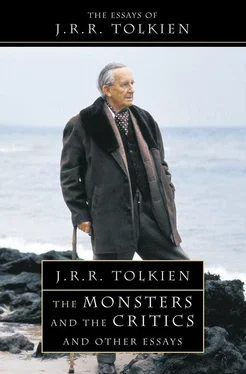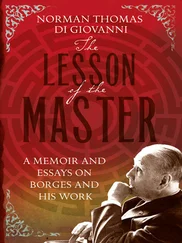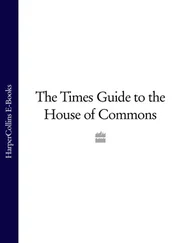But if the specifically Christian was suppressed, 20so also were the old gods. Partly because they had not really existed, and had been always, in the Christian view, only delusions or lies fabricated by the evil one, the gastbona, to whom the hopeless turned especially in times of need. Partly because their old names (certainly not forgotten) had been potent, and were connected in memory still, not only with mythology or such fairy-tale matter as we find, say, in Gylfaginning, but with active heathendom, religion and wigweorþung . Most of all because they were not actually essential to the theme.
The monsters had been the foes of the gods, the captains of men, and within Time the monsters would win. In the heroic siege and last defeat men and gods alike had been imagined in the same host. Now the heroic figures, the men of old, hœleð under heofenum , remained and still fought on until defeat. For the monsters do not depart, whether the gods go or come. A Christian was (and is) still like his forefathers a mortal hemmed in a hostile world. The monsters remained the enemies of mankind, the infantry of the old war, and became inevitably the enemies of the one God, ece Dryhten, the eternal Captain of the new. Even so the vision of the war changes. For it begins to dissolve, even as the contest on the fields of Time thus takes on its largest aspect. The tragedy of the great temporal defeat remains for a while poignant, but ceases to be finally important. It is no defeat, for the end of the world is part of the design of Metod, the Arbiter who is above the mortal world. Beyond there appears a possibility of eternal victory (or eternal defeat), and the real battle is between the soul and its adversaries. So the old monsters became images of the evil spirit or spirits, or rather the evil spirits entered into the monsters and took visible shape in the hideous bodies of the þyrsas and sigel-hearwan of heathen imagination.
But that shift is not complete in Beowulf – whatever may have been true of its period in general. Its author is still concerned primarily with man on earth, rehandling in a new perspective an ancient theme: that man, each man and all men, and all their works shall die. A theme no Christian need despise. Yet this theme plainly would not be so treated, but for the nearness of a pagan time. The shadow of its despair, if only as a mood, as an intense emotion of regret, is still there. The worth of defeated valour in this world is deeply felt. As the poet looks back into the past, surveying the history of kings and warriors in the old traditions, he sees that all glory (or as we might say ‘culture’ or ‘civilization’) ends in night. The solution of that tragedy is not treated – it does not arise out of the material. We get in fact a poem from a pregnant moment of poise, looking back into the pit, by a man learned in old tales who was struggling, as it were, to get a general view of them all, perceiving their common tragedy of inevitable ruin, and yet feeling this more poetically because he was himself removed from the direct pressure of its despair. He could view from without, but still feel immediately and from within, the old dogma: despair of the event, combined with faith in the value of doomed resistance. He was still dealing with the great temporal tragedy, and not yet writing an allegorical homily in verse. Grendel inhabits the visible world and eats the flesh and blood of men; he enters their houses by the doors. The dragon wields a physical fire, and covets gold not souls; he is slain with iron in his belly. Beowulf’s byrne was made by Weland, and the iron shield he bore against the serpent by his own smiths: it was not yet the breastplate of righteousness, nor the shield of faith for the quenching of all the fiery darts of the wicked.
Almost we might say that this poem was (in one direction) inspired by the debate that had long been held and continued after, and that it was one of the chief contributions to the controversy: shall we or shall we not consign the heathen ancestors to perdition? What good will it do posterity to read the battles of Hector? Quid Hinieldus cum Christo? The author of Beowulf showed forth the permanent value of that pietas which treasures the memory of man’s struggles in the dark past, man fallen and not yet saved, disgraced but not dethroned. It would seem to have been part of the English temper in its strong sense of tradition, dependent doubtless on dynasties, noble houses, and their code of honour, and strengthened, it may be, by the more inquisitive and less severe Celtic learning, that it should, at least in some quarters and despite grave and Gallic voices, preserve much from the northern past to blend with southern learning, and new faith.
It has been thought that the influence of Latin epic, especially of the Aeneid, is perceptible in Beowulf , and a necessary explanation, if only in the exciting of emulation, of the development of the long and studied poem in early England. There is, of course, a likeness in places between these greater and lesser things, the Aeneid and Beowulf , if they are read in conjunction. But the smaller points in which imitation or reminiscence might be perceived are inconclusive, while the real likeness is deeper and due to certain qualities in the authors independent of the question whether the Anglo-Saxon had read Virgil or not. It is this deeper likeness which makes things, that are either the inevitabilities of human poetry or the accidental congruences of all tales, ring alike. We have the great pagan on the threshold of the change of the world; and the great (if lesser) Christian just over the threshold of the great change in his time and place: the backward view: multa putans sortemque animo miseratus iniquam. 21
But we will now return once more to the monsters, and consider especially the difference of their status in the northern and southern mythologies. Of Grendel it is said: Godes yrre bœr . But the Cyclops is god-begotten and his maiming is an offence against his begetter, the god Poseidon. This radical difference in mythological status is only brought out more sharply by the very closeness of the similarity in conception (in all save mere size) that is seen, if we compare Beowulf , 740 ff., with the description of the Cyclops devouring men in Odyssey, ix – or still more in Aeneid, iii. 622 ff. In Virgil, whatever may be true of the fairy-tale world of the Odyssey, the Cyclops walks veritably in the historic world. He is seen by Aeneas in Sicily, monstrum horrendum, informe, ingens, as much a perilous fact as Grendel was in Denmark, earmsceapen on weres wœstmum … nœfne he wœs mara þonne œnig man oðer ; as real as Acestes or Hrothgar. 22
At this point in particular we may regret that we do not know more about pre-Christian English mythology. Yet it is, as I have said, legitimate to suppose that in the matter of the position of the monsters in regard to men and gods the view was fundamentally the same as in later Icelandic. Thus, though all such generalizations are naturally imperfect in detail (since they deal with matter of various origins, constantly reworked, and never even at most more than partially systematized), we may with some truth contrast the ‘inhumanness’ of the Greek gods, however anthropomorphic, with the ‘humanness’ of the Northern, however titanic. In the southern myths there is also rumour of wars with giants and great powers not Olympian, the Titania pubes fulmine deiecti , rolling like Satan and his satellites in the nethermost Abyss. But this war is differently conceived. It lies in a chaotic past. The ruling gods are not besieged, not in ever-present peril or under future doom. 23Their offspring on earth may be heroes or fair women; it may also be the other creatures hostile to men. The gods are not the allies of men in their war against these or other monsters. The interest of the gods is in this or that man as part of their individual schemes, not as part of a great strategy that includes all good men, as the infantry of battle. In Norse, at any rate, the gods are within Time, doomed with their allies to death. Their battle is with the monsters and the outer darkness. They gather heroes for the last defence. Already before euhemerism saved them by embalming them, and they dwindled in antiquarian fancy to the mighty ancestors of northern kings (English and Scandinavian), they had become in their very being the enlarged shadows of great men and warriors upon the walls of the world. When Baldr is slain and goes to Hel he cannot escape thence any more than mortal man.
Читать дальше












